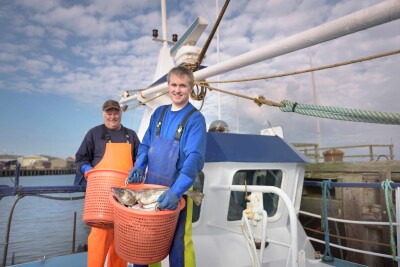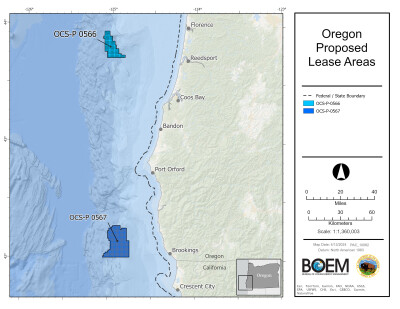The case of Robert Thompson proves that people don't just steal lobster out of traps.
Thompson was the manager of the Spruce Head Fishermen's Cooperative in South Thomaston, Maine, and in that job he was in charge of buying and selling lobsters for one of the state's largest lobster cooperatives.
But he would also buy lobsters directly from co-op members as they unloaded at the dock. He covered the sales by issuing those lobstermen boat slips that didn't include the lobsters he bought. The fraud continued up the seafood chain: According to the U.S. Attorney's Office (as reported by the Bangor Daily News), those illegal lobsters were then bought by J.P. Shellfish in Eliot, Maine. Owner John Price gave his truck drivers cash to pay Thompson and the co-op members when making deliveries (J.P.'s was also Spruce Head's largest legitimate buyer).
NOAA analysts inspect a suspected shipment for seafood fraud. It's estimated 20 to 32 percent of U.S. wild imports are caught illegally, but fewer enforcement agents means the problem will likely get worse. NOAA photo.By buying those lobsters, Thompson was stealing from the co-op. Its members are required to sell their catch back to the organization. His theft was suspected by co-op leaders who installed video surveillance when Thompson went on vacation and worked with NOAA officials and the local sheriff's office to help bring charges against Thompson, who was arrested in October 2012 for felony theft.
This week, Thompson, 53, pled guilty to one count of tax evasion and one count of violation of the Lacey Act, which prohibits illegal sales of lobsters. Thompson, who is expected to be sentenced in the spring, may be given as much as five years in federal prison and a $250,000 fine for the tax evasion. However, last year the state dropped theft charges against Thompson. (The U.S. Attorney's Office requested the state drop the theft charges because it would have been required to give materials to his defense attorney that it said could jeopardize the federal investigation.)
But if the co-op had not been involved in the original investigation, it's possible Thompson's scheme would have lasted much longer. While U.S. commercial fishermen necessarily abide by quotas, monitoring and other sustainability measures, it's apparently getting easier to commit fish fraud. According to an article in the Baltimore Sun, the number of special agents trained to investigate seafood fraud cases has fallen from 147 in 2008 to 93, and their numbers are expected to be further cut. The Sun also found out that in that same time period, the number of civil and criminal cases sent to NOAA's general counsel and U.S. attorneys dropped almost 75 percent, from 793 to 215.
Despite the sometimes acrimonious relationship between NOAA and commercial fishermen in the Northeast, this isn't good news for the industry. Only eight agents monitor domestic fisheries from the coastline extending from New York to Virginia. Those eight agents are also responsible for monitoring 1.4 billion pounds of seafood imports annually. Marine Policy journal reported that 20 to 32 percent of wild imports — worth an estimated $1.3 billion to $2.1 billion — are illegally harvested.
"If I was gonna be a criminal, I would be in the fish and wildlife smuggling business." Scott Doyle, a special agent for NOAA who investigates seafood fraud on the East Coast, told the Sun. "Nobody has any idea what's going on. They just buy the fish."







